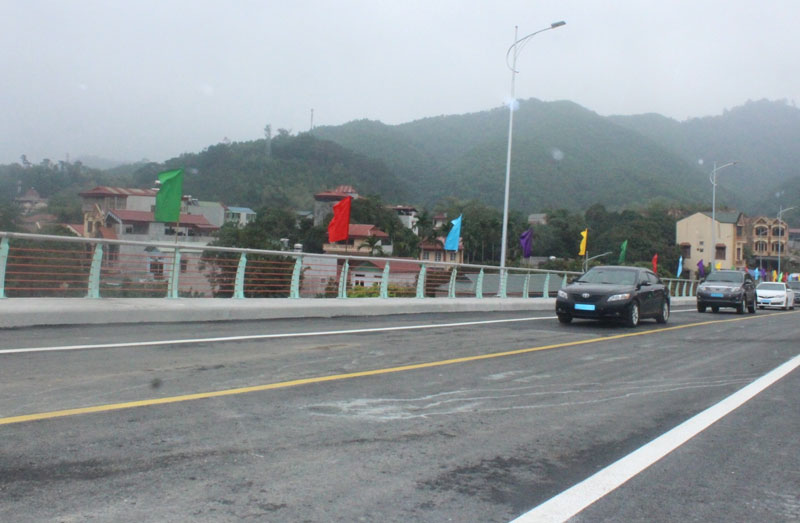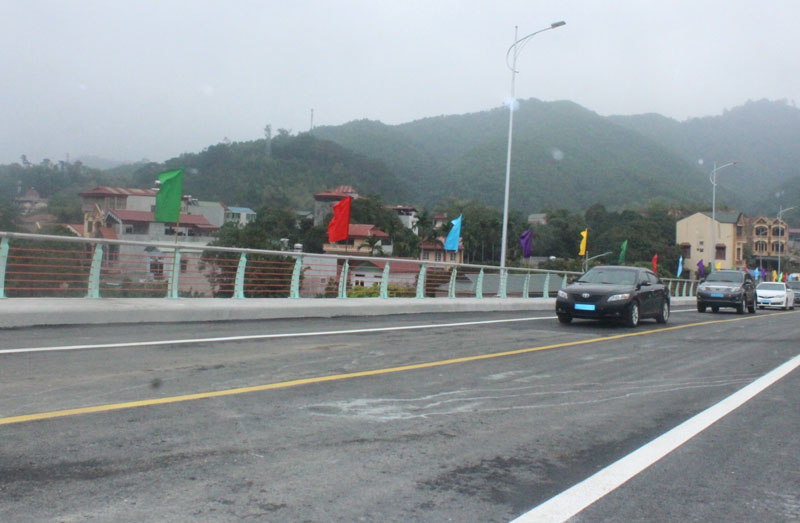
(HBO) – Hoa Binh province has a special geographical location as it is the northwestern gateway to Hanoi and linked with the capital city via Hoa Lac – Hoa Binh Road and National Highway 6. In the future, it will connect with northwestern provinces via a system of modern expressways. The synchronous investment in transport infrastructure and provincial leaders’ wisdom and dynamism will create a solid foundation for Hoa Binh to make breakthroughs in socio-economic development and investment attraction in the time to come.
 Hoa Binh 3 Bridge, inaugurated at the year’s beginning, has helped
perfect the transport infrastructure network of Hoa Binh city.
Hoa Binh 3 Bridge, inaugurated at the year’s beginning, has helped
perfect the transport infrastructure network of Hoa Binh city.
On the stretch of the Da River in Hoa Binh city,
the contractor is racing against time to build Hoa Binh 2 Bridge, which is
expected to have its final sections joined by the end of 2020. Once put into
use, this bridge will, together with other bridges spanning the Da River, help
perfect local transport infrastructure, ease traffic congestion in the downtown
of Hoa Binh city, and become a landmark of the urban landscape here.
Based on the local transport planning for 2020,
with a vision to 2030, a number of facilities important to the province’s security-defence
and socio-economic development have been included in the medium-term public
investment plan for 2016 – 2020 and now under construction, such as the road
linking Ho Chi Minh Road with National Highways 12B and 1, upgrades to
Provincial Road 435, Hoa Binh 2 Bridge, the road linking National Highway 6
with Chi Lang Road, and Trang Bridge.
Thanks to the effective attraction and use of
domestic and foreign investment in transport infrastructure, between 2017 and
2019, Hoa Lac – Hoa Binh Road, built under the BOT format, and Hoa Binh 3
Bridge, funded with official development assistance (ODA) capital, were
completed, helping with the synchronous development of transport infrastructure
and the province’s connectivity with nearby localities.
In the time ahead, Hoa Binh – Moc Chau
Expressway will be built, marking a new stride in transport infrastructure
development and being an important facility serving local socio-economic
development.
Aside from arterial transport facilities, Hoa
Binh province has also paid attention to the rural transport network in recent
years. It has effectively carried out emulation movements to encourage the
local populace to engage in building rural roads and associated the development
of rural transport infrastructure with the implementation of the national
target programmes on new-style rural area building and sustainable poverty
reduction./.
According to data from the Hoa Binh Provincial Party Committee, the industrial production index for the first six months of 2025 is estimated to have increased by 20% compared to the same period last year. This marks the highest year-on-year growth rate for this period since 2020.
In the first six months of 2025, Hoa Binh province’s export turnover was estimated at 1.145 billion USD, marking an 18.11% increase compared to the same period in 2024. Import turnover was estimated at $ 804 million, a 17.15% increase, which helped the province maintain a positive trade balance.
The lives of the ethnic minority farmers in Tan Lac district have gradually improved thanks to the new directions in agricultural production. This is a testament to the collective strength fostered through the professional associations and groups implemented by various levels of the district’s Farmers’ Union.
With the motto the "product quality comes first,” after nearly one year of establishment and operation, Muong village’s Clean Food Agricultural and Commercial Cooperative, located in Cau Hamlet, Hung Son Commune (Kim Boi district), has launched reputable, high-quality agricultural products to the market that are well-received by consumers. The products such as Muong village’s pork sausage, salt-cured chicken, and salt-cured pork hocks have gradually carved out a place in the market and they are on the path to obtaining the OCOP certification.
In the past, the phrase "bumper harvest, rock-bottom prices" was a familiar refrain for Vietnamese farmers engaged in fragmented, small-scale agriculture. But today, a new spirit is emerging across rural areas of Hoa Binh province - one of collaboration, organisation, and collective economic models that provide a stable foundation for production.
Maintaining growing area codes and packing facility codes in accordance with regulations is a mandatory requirement for agricultural products to be eligible for export. Recently, the Department of Agriculture and Environment of Hoa Binh province has intensified technical supervision of designated farming areas and packing facilities to safeguard the "green passport" that enables its products to access international markets.



 Hoa Binh 3 Bridge, inaugurated at the year’s beginning, has helped
perfect the transport infrastructure network of Hoa Binh city.
Hoa Binh 3 Bridge, inaugurated at the year’s beginning, has helped
perfect the transport infrastructure network of Hoa Binh city.